During the first wave of the COVID-19 pandemic, Maria Collard and Matt Keane of Future Forests were so flooded with online orders that they could literally only leave their website shop open for one hour every week.
“And at the height of it, we did two or three weeks where it was just 30 minutes,” says Matt of the demand for their mail order tree and plant range.
But little surprise, because after over 30 years in business, this second-generation garden centre and nursery has made its name supplying Ireland’s gardens, orchards and woodlands; all the way from the wilds of west Cork.

Maria Collard and Matt Keane of Future Forests are planning-and planting- for the next generation. \ Donal O'Leary
And we mean wild. It’s nearly a shock to come across Future Forests – with its fairytale-style wooden hub – on the road between Kealkill and Gougane Barra. But it’s this landscape that Maria’s parents, Mike and Cathy Collard, first fell head over heels for after dropping out of Oxford University.
“At the age of 18 and 19, they came to Ireland on a motorbike,” says Maria. “I think they arrived in Glengarriff and they fell in love and they went to the estate agent’s and said, ‘We want to buy a house’.
“They had very big ideas about how they wanted to live. I think in the UK at the time there was a real big sense of impending nuclear war and they just wanted to go and find a remote place up a mountain and live a simple life. And they found a farmhouse; and it was £1,400 I think.”
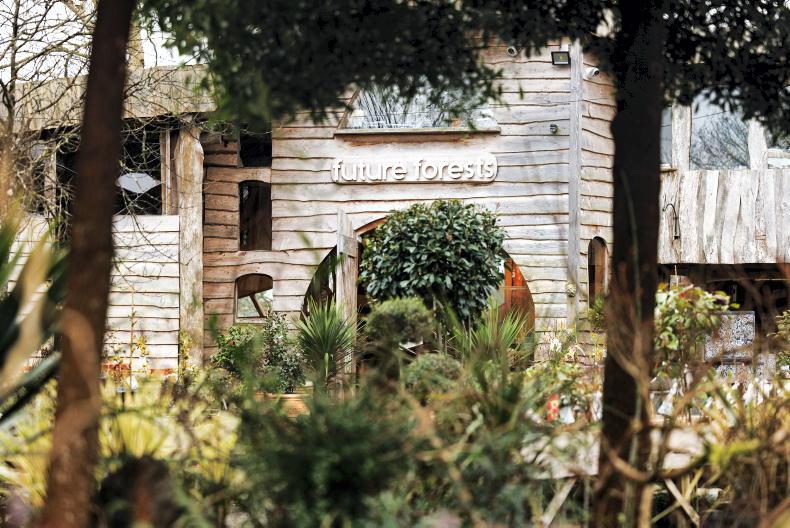
Future Forests is based in the heart of west Cork. \ Donal O'Leary
And when Maria says “simple life”, she means it, even down to her parents actually removing the electricity from the house.
“They really went all out!” she says.
While this did not always make for comfort, it did mean that Maria and her siblings were “so in touch with nature”, especially when her father – who initially worked in gardening, and then forestry – started a small business selling plants.
“I’m not sure quite how it happened, but he took a leap of faith and he started buying plants from a nursery in Belgium, who we still buy from today,” she explains.
“And he got it delivered up to the homeplace, which I can’t even imagine the practicalities of it. And people used to come and buy plants; and Future Forests was born up in the mountains.”
Second generation
Future Forests later moved to its current location near Kealkill, where Mike had been running a sawmill, and built up its reputation; especially after building the garden that won a gold medal at the Chelsea Flower Show for designer Mary Reynolds in 2002. Maria’s brother Christy was also involved in the business, as was family friend Louise Amery, on the administration side.
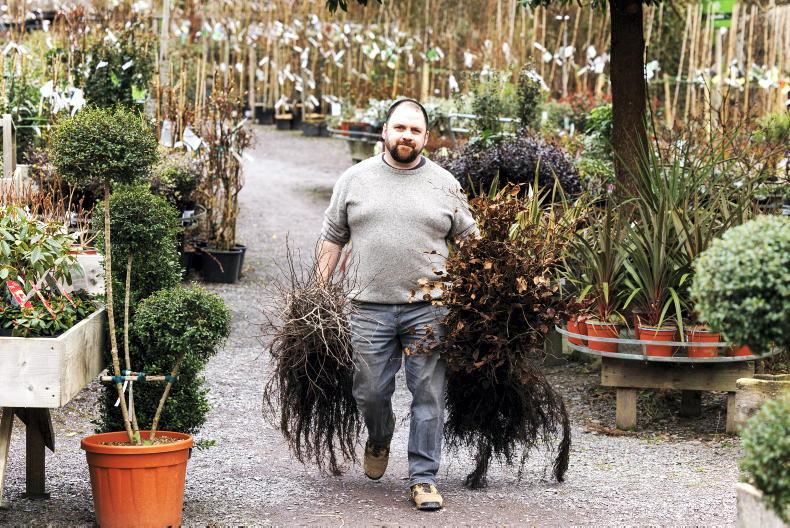
Best-sellers at Future Forests include native trees, hedging and fruit trees. \ Donal O'Leary
At the time, Maria was studying theatre production in Cork, but came on board for the Chelsea project.
“I didn’t finish the course; it was just too big an opportunity to miss,” she recalls, explaining how she moved home afterwards and was out in Bantry one night when she spotted Matt in the local pub. They had previously met at a birthday party, but had not gotten together at that point.
“I think it was about two years of chasing him!” laughs Maria.
After becoming a couple, the pair went travelling the world; but a return to Future Forests made sense, especially as Matt had worked as a landscaper since his teens.
By then, Mike had pulled back from the business after the untimely death of Cathy at just 50.
“We made a decision we would take it on. I was the ripe old age of about 22, and I remember feeling so overwhelmed,” recalls Maria, who explains that a lot of infrastructure needed to be improved; for example, the support beams of their main building were rotting, while they did not have basics like a company van or a delivery yard.
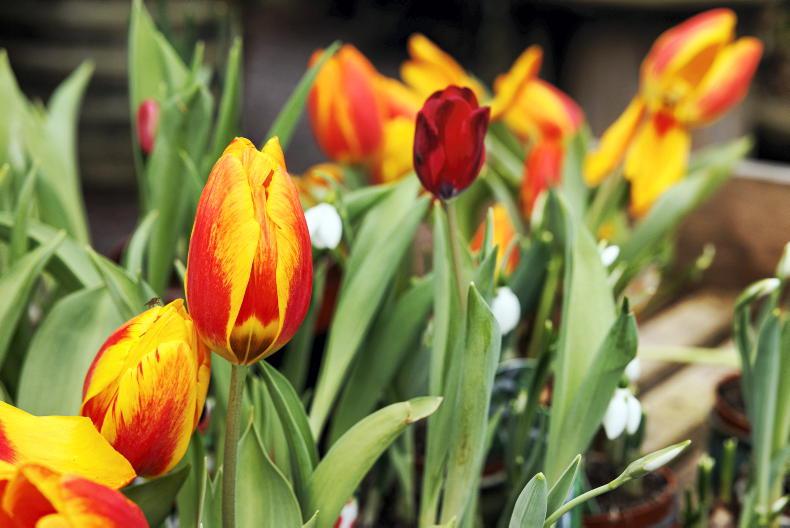
Tulips at Future Forests. \ Donal O'Leary
“So we just tried to focus on making everything better,” continues Maria, “and over time we’ve taken more and more leaps with that.”
For instance, long before most people were shopping online, Future Forests had built up an excellent reputation for mail order business for bare-root and container-grown trees, hedging, fruit, shrubs and other plants.
“It started by accident. It wasn’t a business plan,” explains Matt. “People were like, ‘I’m in Roscommon or Donegal, I can’t come down.’ And literally it was like, ‘Well, I suppose we can stick it in the post!’”
Since taking over, however, Maria and Matt have invested in nursery-specific software and a website and now mail order is over 50% of their business, expertly packed and delivered either by courier, An Post or their own van.
Broad range
And it is no wonder that people from all over Ireland are buying from Future Forests, given their range.
“Because we’re so rural we’ve always tried to have a massive range, so that people who are coming know that they can get a little piece of everything,” says Matt. “And we really think that’s our strength: that you can get a native tree and you can get an unusual fern and a rose. But I would say in terms of the biggest stuff we would sell would be native trees, hedging and fruit.”
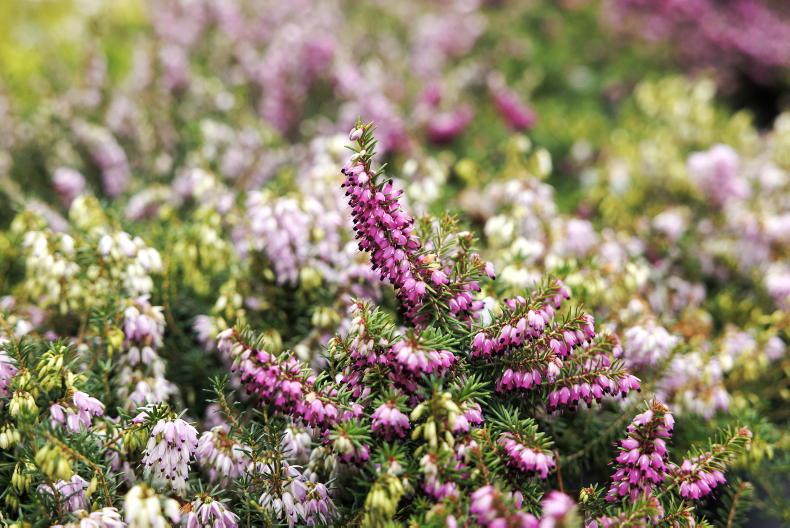
Heathers at Future Forests. \ Donal O'Leary
Wherever possible, Maria and Matt will buy from Irish growers; for instance, the majority of their fruit trees, as well as some of their roses, are supplied by John McNamara in Cork, they buy wildflowers, ferns and unusual perennials from Therese Duffy of Nightpark Plant Nursery in Kildare, native trees and hedging from Fermoy Woodland Nurseries, and everything from unique hydrangeas to unusual conifers from Ravensberg Nurseries in Offaly.
However, they also buy from growers in France and in Belgium as some products are not readily available in Ireland; even when it comes to some of the less commonly known native trees and hedging.
But at Future Forests, they reckon there is a place for both native and non-native.
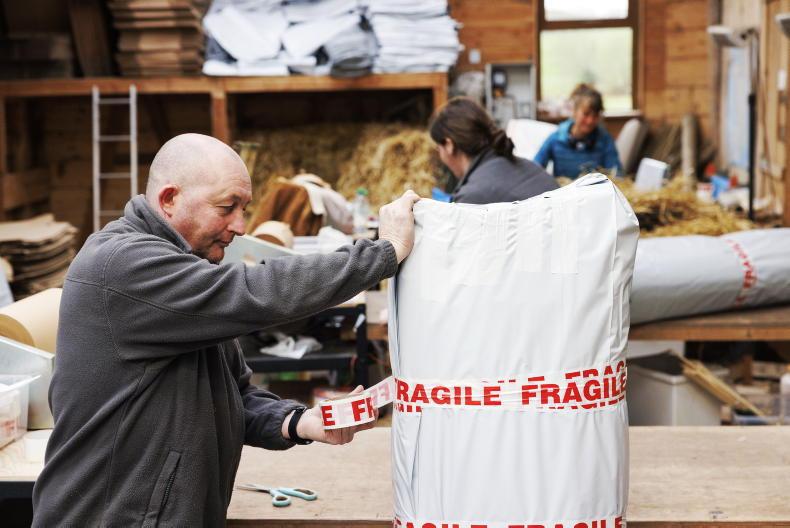
Mail order makes up over 50% of business at Future Forests. \ Donal O'Leary
“And this is obviously a touchy argument people would have,” acknowledges Maria. “Some people would be so purist that you should only be planting native plants in your garden, but all over the world plants have mixed and that was my ethos all along: that there’s a place for both.”
Picking favourites
Fruit trees are a good example of this. I ask Matt and Maria what they would recommend if I were to plant, say an apple tree, in my garden in Tralee.
“If it’s heritage, you’re looking at the Irish varieties, so I’d have to give you a Kerry Pippin for Tralee, I think. And of course you have to decide if you want cookers or eaters, but the most popular heritage varieties for us would be the likes of Kerry Pippin, Irish Peach is really popular, Lough Tree of Wexford, Ard Cairn Russet...” lists Matt, though he qualifies that his favourite apple for eating is actually “Katy”, which is a variety originally from eastern Europe.
Such a recommendation is typical of their tailored approach. When I ask what trees they might recommend, they say it’s very much down to what function customers have in mind.
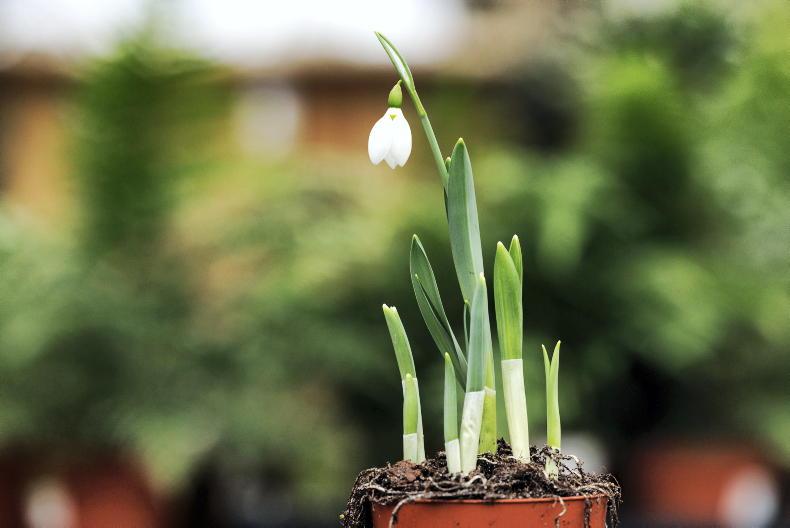
Snowdrops at Future Forests. \ Donal O'Leary
“Some people come and they say just, ‘I need shelter,’” says Matt. “The next person could be, ‘I’ve got a wood-burning stove and I want to plant for future firewood.’”
Practicality aside, however, some plants sell well simply because they are beautiful or unusual; such as the Chilean Guava, which they can “barely keep in”.
“It unusually was Queen Victoria’s favourite fruit,” says Matt. “But it’s an amazing evergreen bush that produces these hard little berries that you think are going to be astringent and horrible; and at the right time, they are like strawberries.”
And what about roses, we ask?
“Rather than picking a favourite, it’s like the beauty all the way from our native Rosa Canina dogrose and the rosehips that come from that and even the Rosa Ragusa, all the way through to the most beautiful, ornate David Austin rose,” answers Maria.
“As you can see, we find it hard to pick our favourite plants,” interjects Matt.
“It’s like your favourite child!” exclaims Maria.
Planning for the future
Future Forests employs 28 staff – many of whom are gardeners themselves – and who Maria and Matt believe are central to the business’ success. Maria’s brother Christy – who runs his own business designing artisan eco-structures – is still involved also as a shareholder and oversees all their building and ground developments.
Last year, Maria and Matt opened a small café on site in a converted container called The Coffee Bee serving seasonal fare; think a Hegarty’s cheddar toasted sandwich or a Miso soup with tofu and scallions.
Post-pandemic, they also made the decision to only open the garden centre to visitors from Thursday – Sunday in winter and from Wednesdays in summer in order to devote the other days to mail order/web business, given its huge success over the pandemic.
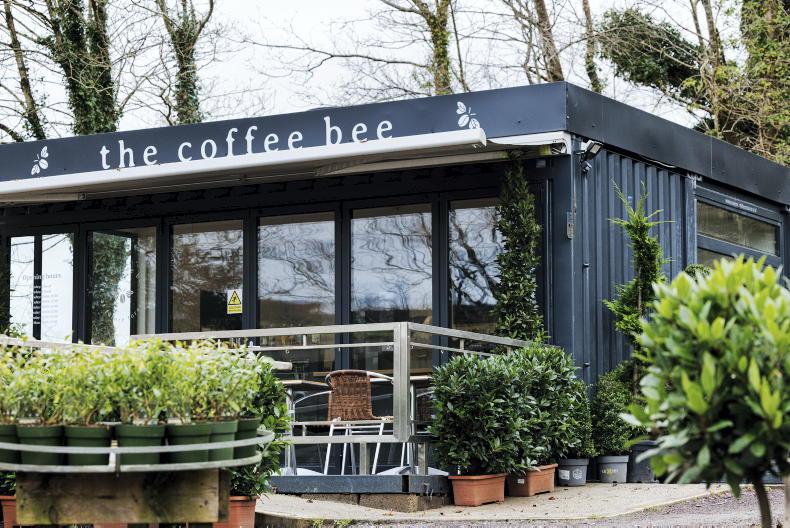
The Coffee Bee is a recent addition at Future Forests. \ Donal O'Leary
“We learned that you can change what you’ve done; and it’s OK” says Maria of the lessons they have taken from COVID-19. “It has definitely made the whole business a lot more efficient.”
They recently received an Enterprise Ireland grant, which they are going to invest in improving their website again and in new nursery software. Needless to say, running this sort of business from rural Ireland has its challenges, chiefly broadband.
“A whole series of 3G SIM cards is how we’re managing to connect,” explains Maria, “so we’re paying for two different companies as we have back up and it’s really frustrating not having proper broadband.”
But with two children of their own now – Ella Rose (14) and Hannah (9) – Maria and Matt’s roots are firmly in west Cork. And Future Forests will continue to grow.
Visit www.futureforests.ie
Read more
Meet The Maker: Ann Marie O’Leary of The Flower Press Company
Born and reared in Australian cattle country: “It’s bred into me”
During the first wave of the COVID-19 pandemic, Maria Collard and Matt Keane of Future Forests were so flooded with online orders that they could literally only leave their website shop open for one hour every week.
“And at the height of it, we did two or three weeks where it was just 30 minutes,” says Matt of the demand for their mail order tree and plant range.
But little surprise, because after over 30 years in business, this second-generation garden centre and nursery has made its name supplying Ireland’s gardens, orchards and woodlands; all the way from the wilds of west Cork.

Maria Collard and Matt Keane of Future Forests are planning-and planting- for the next generation. \ Donal O'Leary
And we mean wild. It’s nearly a shock to come across Future Forests – with its fairytale-style wooden hub – on the road between Kealkill and Gougane Barra. But it’s this landscape that Maria’s parents, Mike and Cathy Collard, first fell head over heels for after dropping out of Oxford University.
“At the age of 18 and 19, they came to Ireland on a motorbike,” says Maria. “I think they arrived in Glengarriff and they fell in love and they went to the estate agent’s and said, ‘We want to buy a house’.
“They had very big ideas about how they wanted to live. I think in the UK at the time there was a real big sense of impending nuclear war and they just wanted to go and find a remote place up a mountain and live a simple life. And they found a farmhouse; and it was £1,400 I think.”

Future Forests is based in the heart of west Cork. \ Donal O'Leary
And when Maria says “simple life”, she means it, even down to her parents actually removing the electricity from the house.
“They really went all out!” she says.
While this did not always make for comfort, it did mean that Maria and her siblings were “so in touch with nature”, especially when her father – who initially worked in gardening, and then forestry – started a small business selling plants.
“I’m not sure quite how it happened, but he took a leap of faith and he started buying plants from a nursery in Belgium, who we still buy from today,” she explains.
“And he got it delivered up to the homeplace, which I can’t even imagine the practicalities of it. And people used to come and buy plants; and Future Forests was born up in the mountains.”
Second generation
Future Forests later moved to its current location near Kealkill, where Mike had been running a sawmill, and built up its reputation; especially after building the garden that won a gold medal at the Chelsea Flower Show for designer Mary Reynolds in 2002. Maria’s brother Christy was also involved in the business, as was family friend Louise Amery, on the administration side.

Best-sellers at Future Forests include native trees, hedging and fruit trees. \ Donal O'Leary
At the time, Maria was studying theatre production in Cork, but came on board for the Chelsea project.
“I didn’t finish the course; it was just too big an opportunity to miss,” she recalls, explaining how she moved home afterwards and was out in Bantry one night when she spotted Matt in the local pub. They had previously met at a birthday party, but had not gotten together at that point.
“I think it was about two years of chasing him!” laughs Maria.
After becoming a couple, the pair went travelling the world; but a return to Future Forests made sense, especially as Matt had worked as a landscaper since his teens.
By then, Mike had pulled back from the business after the untimely death of Cathy at just 50.
“We made a decision we would take it on. I was the ripe old age of about 22, and I remember feeling so overwhelmed,” recalls Maria, who explains that a lot of infrastructure needed to be improved; for example, the support beams of their main building were rotting, while they did not have basics like a company van or a delivery yard.

Tulips at Future Forests. \ Donal O'Leary
“So we just tried to focus on making everything better,” continues Maria, “and over time we’ve taken more and more leaps with that.”
For instance, long before most people were shopping online, Future Forests had built up an excellent reputation for mail order business for bare-root and container-grown trees, hedging, fruit, shrubs and other plants.
“It started by accident. It wasn’t a business plan,” explains Matt. “People were like, ‘I’m in Roscommon or Donegal, I can’t come down.’ And literally it was like, ‘Well, I suppose we can stick it in the post!’”
Since taking over, however, Maria and Matt have invested in nursery-specific software and a website and now mail order is over 50% of their business, expertly packed and delivered either by courier, An Post or their own van.
Broad range
And it is no wonder that people from all over Ireland are buying from Future Forests, given their range.
“Because we’re so rural we’ve always tried to have a massive range, so that people who are coming know that they can get a little piece of everything,” says Matt. “And we really think that’s our strength: that you can get a native tree and you can get an unusual fern and a rose. But I would say in terms of the biggest stuff we would sell would be native trees, hedging and fruit.”

Heathers at Future Forests. \ Donal O'Leary
Wherever possible, Maria and Matt will buy from Irish growers; for instance, the majority of their fruit trees, as well as some of their roses, are supplied by John McNamara in Cork, they buy wildflowers, ferns and unusual perennials from Therese Duffy of Nightpark Plant Nursery in Kildare, native trees and hedging from Fermoy Woodland Nurseries, and everything from unique hydrangeas to unusual conifers from Ravensberg Nurseries in Offaly.
However, they also buy from growers in France and in Belgium as some products are not readily available in Ireland; even when it comes to some of the less commonly known native trees and hedging.
But at Future Forests, they reckon there is a place for both native and non-native.

Mail order makes up over 50% of business at Future Forests. \ Donal O'Leary
“And this is obviously a touchy argument people would have,” acknowledges Maria. “Some people would be so purist that you should only be planting native plants in your garden, but all over the world plants have mixed and that was my ethos all along: that there’s a place for both.”
Picking favourites
Fruit trees are a good example of this. I ask Matt and Maria what they would recommend if I were to plant, say an apple tree, in my garden in Tralee.
“If it’s heritage, you’re looking at the Irish varieties, so I’d have to give you a Kerry Pippin for Tralee, I think. And of course you have to decide if you want cookers or eaters, but the most popular heritage varieties for us would be the likes of Kerry Pippin, Irish Peach is really popular, Lough Tree of Wexford, Ard Cairn Russet...” lists Matt, though he qualifies that his favourite apple for eating is actually “Katy”, which is a variety originally from eastern Europe.
Such a recommendation is typical of their tailored approach. When I ask what trees they might recommend, they say it’s very much down to what function customers have in mind.

Snowdrops at Future Forests. \ Donal O'Leary
“Some people come and they say just, ‘I need shelter,’” says Matt. “The next person could be, ‘I’ve got a wood-burning stove and I want to plant for future firewood.’”
Practicality aside, however, some plants sell well simply because they are beautiful or unusual; such as the Chilean Guava, which they can “barely keep in”.
“It unusually was Queen Victoria’s favourite fruit,” says Matt. “But it’s an amazing evergreen bush that produces these hard little berries that you think are going to be astringent and horrible; and at the right time, they are like strawberries.”
And what about roses, we ask?
“Rather than picking a favourite, it’s like the beauty all the way from our native Rosa Canina dogrose and the rosehips that come from that and even the Rosa Ragusa, all the way through to the most beautiful, ornate David Austin rose,” answers Maria.
“As you can see, we find it hard to pick our favourite plants,” interjects Matt.
“It’s like your favourite child!” exclaims Maria.
Planning for the future
Future Forests employs 28 staff – many of whom are gardeners themselves – and who Maria and Matt believe are central to the business’ success. Maria’s brother Christy – who runs his own business designing artisan eco-structures – is still involved also as a shareholder and oversees all their building and ground developments.
Last year, Maria and Matt opened a small café on site in a converted container called The Coffee Bee serving seasonal fare; think a Hegarty’s cheddar toasted sandwich or a Miso soup with tofu and scallions.
Post-pandemic, they also made the decision to only open the garden centre to visitors from Thursday – Sunday in winter and from Wednesdays in summer in order to devote the other days to mail order/web business, given its huge success over the pandemic.

The Coffee Bee is a recent addition at Future Forests. \ Donal O'Leary
“We learned that you can change what you’ve done; and it’s OK” says Maria of the lessons they have taken from COVID-19. “It has definitely made the whole business a lot more efficient.”
They recently received an Enterprise Ireland grant, which they are going to invest in improving their website again and in new nursery software. Needless to say, running this sort of business from rural Ireland has its challenges, chiefly broadband.
“A whole series of 3G SIM cards is how we’re managing to connect,” explains Maria, “so we’re paying for two different companies as we have back up and it’s really frustrating not having proper broadband.”
But with two children of their own now – Ella Rose (14) and Hannah (9) – Maria and Matt’s roots are firmly in west Cork. And Future Forests will continue to grow.
Visit www.futureforests.ie
Read more
Meet The Maker: Ann Marie O’Leary of The Flower Press Company
Born and reared in Australian cattle country: “It’s bred into me”














 This is a subscriber-only article
This is a subscriber-only article










SHARING OPTIONS: